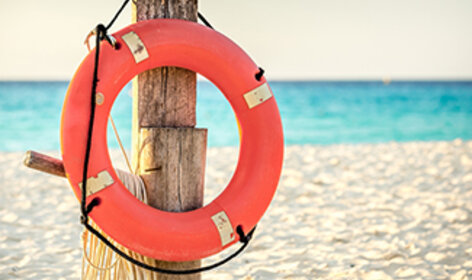Avoid swimming accidents: Safe behavior in the water
Emergency and rescue medicine(1.06.2025) Summer attracts many people to lakes, rivers and swimming pools. But tragic swimming accidents happen again and again - often even though the people involved were able to swim.
More than 400 people drowned in swimming accidents in Germany in 2024. "Many people underestimate the dangers in the water. The majority of those who drown each year were able to swim," warns Dr. Melanie Mörsdorf-Kroll, senior physician at the Center for Emergency and Rescue Medicine at the University Medical Center Freiburg. Why do so many people still get into difficulties?

Most people drown silently and are therefore not noticed by others. ©freepik/ededchechine
The biggest dangers when swimming
Mörsdorf-Kroll explains: "If you jump straight into cold water after being heated up by the sun, you risk a cold shock. Your circulation can be so severely affected that you lose consciousness and sink." Muscle cramps caused by overexertion or overconfidence also play a major role - often in combination with alcohol.
Most people drown silently
Another risk: unlike in the movies, drowning usually happens silently. "People fight with all their strength against going under, they are often unable to call out or wave. That's why they often go unnoticed by others," emphasizes the emergency physician.
Follow the three most important bathing rules
To avoid swimming accidents, Dr. Mörsdorf-Kroll advises following these three simple rules:
- Cool down before swimming:
"Cool down before jumping into the water to avoid cold shock." - Never go into the water alone:
"Always swim with someone. That way, help can be called quickly in an emergency." - Realistically assess your own abilities:
"Don't underestimate the currents and distances - especially in rivers and lakes. Don't overestimate your strength!"
What to do in an emergency?
If someone is in distress in the water, Dr. Mörsdorf-Kroll warns: "Don't jump in after them without thinking. Call for help and look for a buoyant object that you can throw to the person."
Particularly important: drowning people often develop enormous strength and cling to anything they can reach in their panic. "Anyone who is not specially trained for rescue operations in water should never attempt to rescue a drowning person directly - the risk of getting into distress yourself is very high," emphasizes Mörsdorf-Kroll. Self-protection always comes first!
More interesting articles
University Medical Center Freiburg
Central InformationPhone: 0761 270-0
info@uniklinik-freiburg.de
Corporate Communications
Breisacher Straße 15379110 Freiburg
Phone: 0761 270-84830
kommunikation@uniklinik-freiburg.de



